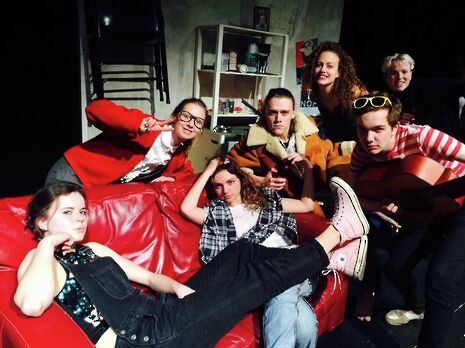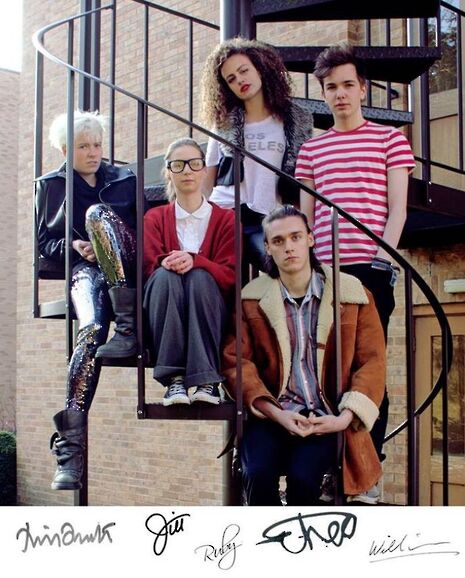Review: BAND
Jon Wall is impressed by the composition and quality of writing in Olivia Gillman’s BAND, but finds it a little style over substance

Olivia Gillman’s Harry Porter Prize-nominated BAND is a play about a group of millennials who are perhaps a little too middle-class and a little too self-obsessed - so of course they decide to start a band. Peopled by a cast of caricatures who are only a little removed from ArcSoc regulars, Gillman’s little nods to a culture of indie cliché - Glass Animals and Portobello Road Market, for example - help to root the production into a familiar cultural setting, while allowing her characters to become suitably offbeat.
This, though, has the effect of making this production feel less a play and more sitcom. Characters such as Jill, a stereotyped and socially awkward geek, and Theo, a loudmouth London bullshit-merchant, coupled with the music-mediated scene transitions, certainly lend themselves to this sitcom-esque set-up. However, this is not necessarily a negative comment, more a reflection on what to expect. For a production which advertised itself as a commentary on image-obsessed millennial culture in its initial performance at last year’s Downing Festival of New Writing, perhaps more depth of character could be expected. It’s very well to create shallow characters as a response to a shallow culture, but when they have little underlying motive they quickly become unsympathetic.
"When the actors fully commit to the caricature they are playing, the results are, generally, spectacular"
Perhaps the best example of this is Comrie Saville-Ferguson’s Will, a wannabe guitarist whose centrality in the band is threatened by session musician Theo. While played creditably, the desperate unsubtlety of his main motivation and jealousy of Theo’s attempts to seduce his girlfriend, lead singer Ruby, make his climactic monologue feel a little too serious and at odds with the general tone of the play.
By contrast, when the actors fully commit to the caricature they are playing, the results are, generally, spectacular. Hollie Witton’s Jill is the source of a significant proportion of the humour in the play, with her uptight, very literal character played beautifully. This character certainly had the potential to become all too cringeworthy, but Witton’s tone redeemed this and made the character’s one-liners a highlight.

Likewise, Benedict Clarke’s Theo dominates the stage with his physicality, easily stealing each scene with a throwaway anecdote or fragment of paraphrased wisdom delivered in a well-timed, off-hand manner. Minor characters such as Ania Magliano-Wright’s Tania or Jasmin Rees’s Jem, though, are less convincing portrayals of caricature, though I would suggest that the lack of material they are given, serving mostly to advance the plot, as the primary reason for this. It’s hard not to feel sorry for undeveloped characters such as Rox Middleton’s Matilda, whose role in the band is never really fully established and whose relationships with other characters are rather indeterminate.
However, it’s worth noting that that the production of the play has been very well thought-out, and the emphasis on rooting these characters in familiar surroundings unquestionably pays off here. The setting of Jill’s parents’ garage is just about the right level of cluttered and feels authentic, and the scene transitions’ use of Tania’s genre of choice – French house music with banjo – is a fun touch.
The main attraction of this play is its sharp wit. Each character has their share of scathing put-downs and hilarious one-liners, with some repeated jokes. The fork analogy was a particular favourite, providing a sense of completeness to the play. While some scenes extended a little beyond their required length given the rather flimsy plot, the humour generally makes this forgivable.
"The show feels like the pilot for a decent sitcom - entertaining and sharp"
In short, this play hasn’t quite worked out what it is. The skill in the writing, the creation of sharp wit for the rather stereotyped characters to use, is admirable. Yet, it could have been tightened up a little to focus on making the most of the brilliant repartee, rather than making the unsubtle point about image-consciousness. The show feels like the pilot for a decent sitcom - entertaining and sharp, but not quite self-contained
 News / Fitz students face ‘massive invasion of privacy’ over messy rooms23 April 2024
News / Fitz students face ‘massive invasion of privacy’ over messy rooms23 April 2024 Comment / Gown vs town? Local investment plans must remember Cambridge is not just a university24 April 2024
Comment / Gown vs town? Local investment plans must remember Cambridge is not just a university24 April 2024 News / Cambridge University disables comments following Passover post backlash 24 April 2024
News / Cambridge University disables comments following Passover post backlash 24 April 2024 Comment / Does Lucy Cavendish need a billionaire bailout?22 April 2024
Comment / Does Lucy Cavendish need a billionaire bailout?22 April 2024 Interviews / Gender Agenda on building feminist solidarity in Cambridge24 April 2024
Interviews / Gender Agenda on building feminist solidarity in Cambridge24 April 2024





